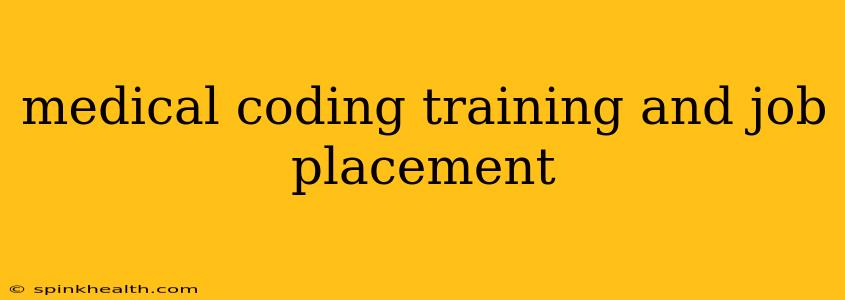The world of healthcare is constantly evolving, and behind every patient interaction, medical record, and insurance claim lies the crucial work of medical coders. If you're drawn to the detail-oriented nature of healthcare and the satisfaction of contributing to efficient medical billing, a career in medical coding might be the perfect fit. But how do you get started, and even more importantly, how do you secure a job after completing your training? This comprehensive guide will navigate you through the journey of medical coding training and job placement, sharing insights and answering your burning questions.
My name is Sarah, and I've spent the last 10 years working in medical billing and coding, both as a coder and as a trainer. I've witnessed firsthand the rewarding aspects of this career, as well as the challenges of entering the field. This guide is based on my experience and extensive research, designed to help aspiring medical coders like you succeed.
What is Medical Coding?
Medical coding is the process of transforming medical diagnoses, procedures, and services into standardized numerical and alphanumeric codes. These codes are essential for insurance claims processing, medical record keeping, and healthcare data analysis. Think of it as the language that healthcare providers use to communicate with insurance companies and track patient care. Accuracy is paramount, as even a small error can lead to delays in payment or inaccurate data.
What Type of Medical Coding Training is Right for Me?
Choosing the right training program is crucial for your success. Several options exist, each with its pros and cons:
-
Associate Degree Programs: These offer a comprehensive education, often including coursework in anatomy, physiology, and medical terminology, alongside coding specifics. They often lead to higher starting salaries.
-
Certificate Programs: These are shorter and more focused, ideal for individuals who already possess some healthcare background or prefer a quicker path to certification.
-
Online Courses: The flexibility of online learning is a huge draw, allowing you to study at your own pace. However, ensure the program is accredited and provides adequate hands-on practice.
-
On-the-Job Training: Some healthcare facilities offer on-the-job training, though this is less common and often requires prior healthcare experience.
What Certifications are Available After Medical Coding Training?
Several certifications demonstrate your competency and increase your job prospects. The most common are:
-
Certified Professional Coder (CPC): Awarded by the American Academy of Professional Coders (AAPC), it's widely recognized in the industry.
-
Certified Coding Specialist (CCS): Offered by AHIMA (American Health Information Management Association), this certification is equally respected.
-
Certified Coding Associate (CCA): A less advanced certification from AHIMA, often a stepping stone to the CCS.
How Can I Find Medical Coding Job Placement Assistance?
Many reputable training programs offer job placement assistance as part of their curriculum. This can include:
-
Resume and cover letter review: Professional guidance to create compelling application materials.
-
Interview preparation: Mock interviews and coaching to improve your interviewing skills.
-
Networking opportunities: Connections with healthcare employers through job fairs and career services.
-
Job boards and postings: Access to exclusive job listings and recruitment services.
How Much Can I Expect to Earn After Completing My Training?
Salary expectations vary based on experience, location, certification, and employer. However, you can anticipate a competitive starting salary with growth potential as you gain experience and expertise.
What are the Job Prospects in Medical Coding?
The Bureau of Labor Statistics projects significant growth in healthcare occupations, including medical coding and billing specialists. This makes it a career with a promising outlook.
What are the Daily Responsibilities of a Medical Coder?
A typical day for a medical coder might involve:
- Reviewing medical records: Extracting information on diagnoses, procedures, and services.
- Assigning codes: Using coding manuals (such as ICD-10 and CPT) to select appropriate codes.
- Ensuring code accuracy: Double-checking codes for compliance and avoiding errors.
- Preparing claims: Formatting claims for submission to insurance companies.
- Working with other healthcare professionals: Collaborating with billers, physicians, and other staff.
What Skills Do I Need to Succeed as a Medical Coder?
Beyond the technical knowledge of coding, strong skills in attention to detail, analytical thinking, and proficiency in medical terminology are essential. Strong computer skills and the ability to work independently are also advantageous.
Are There Different Specializations Within Medical Coding?
Yes! While general medical coding is a common path, specialization is possible in areas like:
- Inpatient coding: Focusing on hospital settings.
- Outpatient coding: Working in clinics or physician offices.
- Surgical coding: Specializing in surgical procedures.
- Specialty coding (e.g., cardiology, oncology): Requiring a deeper understanding of specific medical fields.
Embarking on a career in medical coding is a journey that combines detailed work with a meaningful contribution to the healthcare system. By carefully selecting your training program, focusing on essential skills, and actively seeking job placement assistance, you can confidently navigate your path to a successful and rewarding career. Remember to leverage all the resources available to you, network with professionals in the field, and stay updated on the latest coding guidelines and technologies. Your future as a proficient medical coder is bright!

